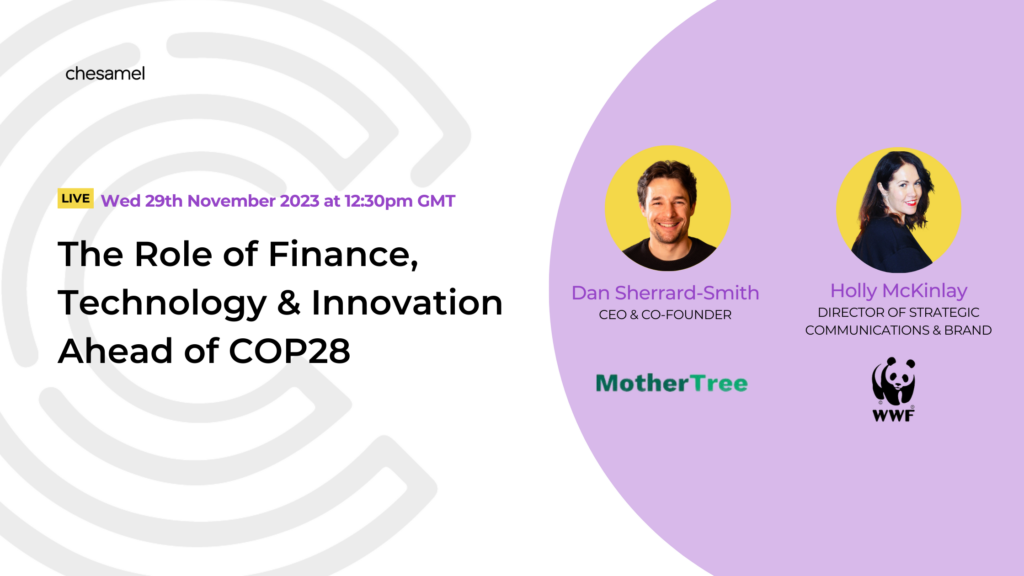After a year where the urgency of addressing environmental, social, and governance (ESG) issues is evidently escalating, our recent webinar, “The Role of Finance, Technology & Innovation Ahead of COP28,” presented invaluable insights. Hosted by Charlie Eyeington and Maximilian Rossi of Chesamel, the event featured Dan Sherrard-Smith from Mother Tree and Holly McKinlay of WWF-UK, who shared their profound expertise in sustainable practices and strategic communications.
It was a privilege to host such an engaging and insightful webinar ahead of COP28. We’ll be touching on a few of our favourite insights in this blog post but to get the most value we recommend watching the full webinar here.
Here are some of the highlights.

Collaboration for a Sustainable Future
Holly McKinlay emphasised the critical role of collaboration in tackling ESG issues. Not only between various stakeholders but more somoreso between climate and nature. The interconnectedness of climate and nature presents not just a challenge but a significant opportunity for businesses and politicians. Holly explained how this holistic approach can transform how we view and interact with our environment. Nature, often overlooked, holds immense potential as a tool for climate solutions.
This is a strategy we feel deserves more attention in boardrooms and one we were fascinated to hear about from Holly. Because when push comes to shove, the severity of not trying new or more uncommon strategies is evident.
Deloitte research reveals inaction on climate change could cost the world’s economy US$178 trillion by 2070. This is a future we at Chesamel are dedicated to avoid and improve.
Balancing Profit and Planet
Many businesses nowadays are trying to engage in robust ESG practices, such as diversity, equity, and inclusion (DEI), because it can benefit them in several ways. These benefits include increased ability to innovate, retain employees, improve resilience in times of crisis, and compete effectively in various markets. However, the financial viability of such developments can hold back a company from making the right sustainable investment.
Dan Sherrard-Smith’s insights provided a pragmatic approach for businesses striving to harmonise sustainability with financial viability. He explained how the key lies in smart, sustainable investments. These options include DIY models, working with independent financial advisors, and impact investments that actively invest in high-impact sustainability companies.
Interestingly, studies from The National Bureau of Economic Research suggest that active sustainable investing strategies, like shareholder engagement and activism, are more effective than passive forms in shaping ESG practices and contributing to shareholder value.
These types of smart sustainable investments not only align with ethical values but can also be economically beneficial for businesses. But before you dive head first into a new type of investment, it is recommended that you do thorough research and ensure that any new investments align with your desired sustainability goals.

Practical Advice for Sustainable Choices
For businesses and individuals eager to contribute positively, we’ve summarisedsumarised the main practical advice offered by the panellistspanelists into short checklists:
Adopt Collaborative Approaches
- Collaborate with local and national governments to align business practices with regulatory frameworks and policies focused on sustainability.
- Partner with environmental NGOs and non-profits to gain insights into sustainable practices and contribute to community-based environmental projects.
- Join industry alliances or forums that focus on sustainability to share best practices and collaborate on large-scale initiatives.
Invest Wisely
- Explore funds that focus on companies with strong ESG ratings, as these investments can drive both financial returns and positive environmental or social impacts.
- Consider investing in green bonds, which are designed to finance projects with environmental benefits.
- Implement an ESG assessment framework to evaluate current investments and guide future investment decisions towards more sustainable options.
Utilise Data & AI
- Utilise data analytics tools to measure and monitor the environmental impact of your operations, guiding more sustainable business decisions.
- Implement AI-driven technologies to optimise energy use, reduce waste, and improve supply chain efficiency.
- Invest in research and development of sustainable technologies or products that can offer competitive advantages while benefiting the environment.
Educate and Influence
- Launch awareness campaigns to educate both internal stakeholders (employees, management) and external stakeholders (customers, suppliers) about the importance of sustainability.
- Regularly report on your company’s sustainability efforts and achievements to build transparency and credibility.
- Engage with local communities to understand their environmental concerns and include their insights into your sustainability strategies.
As we look past COP28 and beyond, the insights we discover from our webinars aim to serve as a guiding light. The path to sustainability is a collective journey requiring transparency, innovation, and a deep understanding of the symbiotic relationship between our planet’s health and our economic practices. It’s time for businesses and individuals to embrace this transformative journey for a sustainable and prosperous future.
Bear in mind, this was just a peek into the fascinating discussions we had on our webinar. To learn more about the importance of transparency, collaboration, and data-driven approaches in addressing sustainability and driving positive change, you can watch the full recording here.


